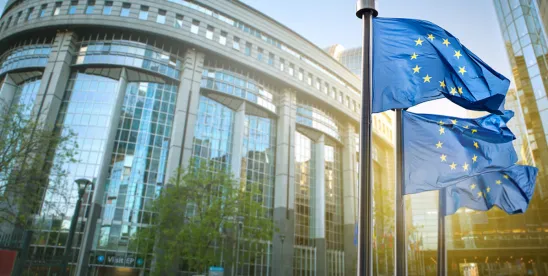The wide-ranging impact of environmental, social, and corporate governance (ESG) is also making itself felt in relation to product lifecycle and consumer protection regulation, as can be seen from the latest European Union (EU) proposals on the so-called “right to repair” for European consumers.
In line with its green objectives, the EU is seeking to extend the scope of the existing Directive 2009/125/EC (the Ecodesign Directive),1 which lays down rules for improving the environmental performance of certain products, and to implement additional requirements aimed at ensuring more sustainable products (the Proposal).2
This alert considers the important implications of the Proposal for product manufacturers, including what is expected in terms of product design and spare parts supply for goods falling within the scope of this legislation.
THE CURRENT RULES
Overview of the Current EU Ecodesign Directive
The Ecodesign Directive lays down a framework for the development of consistent EU-wide rules for improving the environmental performance of certain energy-intensive products, such as household appliances, information and communication technologies, and engineering goods, as well as products having an “impact on energy consumption” (such as windows and insulation). The Directive sets out minimum mandatory requirements for the energy efficiency of the products covered.
Modernization of the Resource Efficiency of Certain Products In 2019
In 2019, the EU introduced the Ecodesign and Energy Labelling Package (the Ecodesign Package) aimed at creating further resource efficiency and bolstering consumers’ right to repair certain products. The Ecodesign Package included requirements to improve the design of certain products, make spare parts available, and allow independent repairers access to technical information to aid in repairing products. Ten implementing regulations applied to 10 categories of product groups:
-
Refrigerators;3
-
Washing machines;4
-
Dishwashers;5
-
Home televisions and electronic displays;6
-
Light sources and separate control gears;7
-
External power supplies;8
-
Electronic motors;9
-
Refrigerators with a direct sales function;10
-
Power transformers;11 and
-
Welding equipment.12
Under the Ecodesign Package, both manufacturers and importers are required to make available to professional repairers a series of essential parts (motors and brushes, pumps, shock absorbers and springs, washing drums, etc.) for at least seven to 10 years after the last unit of a model is placed on the EU market.
Additionally, in relation to certain products, manufacturers must also make spare parts and information suitable for non-professional repairs available to consumers that wish to repair their product. These additional rules currently only apply to refrigeration appliances, washing machines, dryers, and dishwashers.
These requirements apply to all of the in-scope products placed on the market in the EU, whether the supplier is an EU entity or not. These products must comply with the above requirements in order to be “CE” marked.
NATIONAL IMPLEMENTATION
The United Kingdom (UK) and EU Member States have all implemented the existing Ecodesign Directive. The table at the end of this alert summarizes the main laws across certain key territories.
An Enhanced Ecodesign Regime
In March 2022, the European Commission announced that it plans to put forward a legislative proposal on the right to repair. According to the 2022 European Commission work program, the Proposal is expected in the third quarter of 2022. The aim is to encourage consumers to use products for longer by repairing defective goods and by purchasing more second-hand and refurbished goods.
This Proposal follows calls from consumer rights groups, which have seen support from the European Parliament for some time. The European Parliament views the right to repair as a key step in achieving the circular economy plans within the European Green Deal.
Among other objectives, it is expected that the Proposal will seek to combat the alleged practice of “planned obsolescence,” where manufacturers intentionally design their products to degrade over time so as to encourage customers to purchase newer, and often more expensive, models and to limit the second-hand product market.
Whilst the Ecodesign Package required that it should not be more difficult than necessary to repair a product and laid down rules to give customers access to replacement parts, it has been criticized by some consumer groups for still being too limited in scope, and their hope is that the Proposal will broaden and strengthen the right to repair further.
What will the Proposal Require?
The Proposal is expected to have a broad remit by extending the scope of the existing Ecodesign Directive and establishing a more extensive framework beyond the Ecodesign Package’s focus on energy-related products. Relevant elements of the Proposal include:
-
Creating a set of requirements tailored to the particular characteristics of the product groups concerned, acknowledging that one set of rules cannot uniformly apply to all product groups;
-
Covering areas such as: product durability, reliability, reparability, and ease of maintenance; energy use; resource use; minimum recycled content; life-cycle environmental impact; and the prevention and reduction of waste;
-
Implementing a digital product passport for product groups covered by the Proposal to help businesses and customers make informed choices through access to transparent environmental information. It is possible that this may pave the way for wider voluntary data sharing beyond Ecodesign requirements; and
-
Preventing the destruction of unsold goods by requiring businesses to disclose the amounts of and reasons for the products they discard each year and how they are environmentally processed. The Proposal also alludes to a blanket ban on the destruction of unsold goods entirely for certain products.
Furthermore, on 7 April 2022, the European Parliament adopted a resolution calling for the right to repair to address the whole life cycle of products, from product design through to production, standardization, information labelling (e.g., on reparability and on the expected lifespan of a product), consumer guarantees, and public procurement. For instance, at the design stage, products will need to be designed so that a repairer can use common tools to replace the parts (this would prevent manufacturers from sealing their products in such a way as to require specialist equipment inaccessible to the average consumer).
What Products are covered by the Proposal?
In order to achieve the EU’s Green Deal objectives, a broadening of the Ecodesign Directive’s scope beyond energy-related products can be expected. The Proposal has the potential to cover any physical non-perishable product placed on the EU market. While certain product groups with a high environmental impact and potential for improvement have already been identified by the Commission, such as the tyre, lubricants, and steel industries, the EU is expected to identify product groups by the end of 2022 as part of its working plan. Suppliers might also expect to experience increasing demand over time from their consumers and downstream partners for voluntary “right to repair” commitments.
CONCLUSION
In view of the fast-changing regulatory landscape, it is vital that product designers and manufacturers of all industries pay close attention to the right-to-repair developments on the horizon. It will be much more difficult to ‘repair’ a legal compliance problem and risk of exposure down the line if companies do not prepare for these new rules early. Our team is available to discuss any questions about the regulations that may apply to your products and how to ensure you are ready.
CURRENT NATIONAL ECODESIGN RULES IN KEY TERRITORIES
|
Jurisdiction |
Implementing Law |
Comments |
|---|---|---|
|
France |
Decree No. 2011-764 of 28 June 2011 and Amended order of 3 August 2011 |
France has adopted the anti-waste law for a circular economy on 10 February 2020, which aims to accelerate the change of production and consumption model in order to limit waste and preserve natural resources, biodiversity, and climate. The French anti-waste law goes beyond the EU Directive by requiring information on the legal guarantee of conformity of products and the creation of a reparability index to inform customers how easy it is to repair a product. |
|
Belgium |
Law of 27 July 2011 |
This introduced an obligation for the manufacturers to ensure, in the form they deem appropriate, that consumers of energy-related products are provided notably with:
Violations of the obligations imposed by the Ecodesign Directive are subject to administrative or criminal proceedings and are punishable by imprisonment for a term of eight days to three years and/or a fine of €160 to €4,000,000. |
|
Italy |
Legislative Decree no. 15/2011 |
The Ministry of Economic Development, in order to verify the conformity of the products to the enforcement measures, can avail itself of the resources of numerous public bodies, including the Agenzia nazionale per le nuove tecnologie, l'energia e lo sviluppo economico sostenibile (the Italian National Agency for new technologies, energy and sustainable economic development), the Chambers of Commerce, the Customs Agency, the Guardia di Finanza, among others. The manufacturer, its authorized representative, the importer, or anyone who places on the market or puts into service products without the “CE” marking or the “CE” declaration of conformity or with counterfeit marking or declaration is subject to administrative fines. |
|
United Kingdom |
Ecodesign for Energy-Related Products and Energy Regulations 2021 |
Despite leaving the EU, the UK had voted in favour of this Ecodesign Package in 2019, but a number of the requirements were not in force by the end of the Brexit transition period. In light of this, a consultation by the UK Government in September 2020 showed strong support for the implementation of the additional regulations. As a result, the UK aligned its requirements with that of the EU through the Ecodesign for Energy-Related Products and Energy Regulations 2021. While the UK has for now aligned its Ecodesign regulations with the EU, it is likely that there will be divergence in the future. Accordingly, manufacturers should stay afoot of the developments to ensure they remain compliant with this separate regime. In order to achieve its European Green Deal objectives, the EU is looking to further their sustainable products initiative. This would include an overhaul of the Ecodesign Directive to enable it to go beyond energy-related products and implement requirements for environmental factors in product design. Manufacturers who produce products for both the UK and the EU will need to keep an eye on these developments. |
Ryan Mullen also contributed to this article.
FOOTNOTES
1 Directive 2009/125/EC of the European Parliament and of the Council of 21 October 2009 establishing a framework for the setting of Ecodesign requirements for energy-related products (recast).
2 Communication from the Commission to the European Parliament, the Council, the European Economic and Social Committee, and the Committee of the Regions on Making Sustainable Products the Norm.
3 Regulation (EU) 2019/2019.
4 Regulation (EU) 2019/2023.
5 Regulation (EU) 2019/2022.
6 Regulation (EU) 2019/2021.
7 Regulation (EU) 2019/2020.
8 Regulation (EU) 2019/1782.
9 Regulation (EU) 2019/1781.
10 Regulation (EU) 2019/2024.
11 Regulation (EU) 2019/1783.
12 Regulation (EU) 2019/1784.







 />i
/>i

